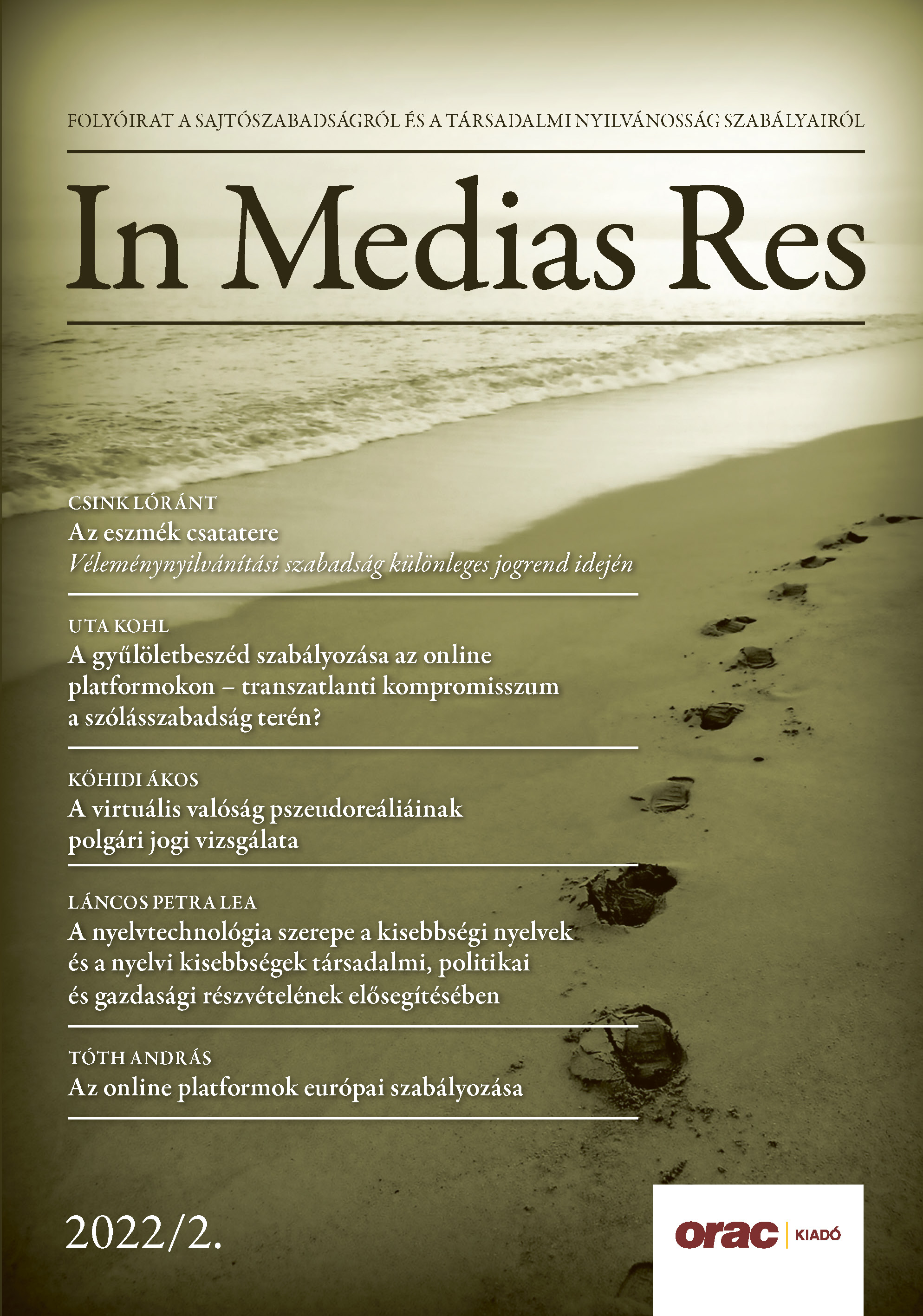The Role of Language Technology in Promoting the Social, Political and Economic Participation of Minority Language Speakers and Members of Linguistic Minorities
DOI:
https://doi.org/10.59851/imr.11.2.5Keywords:
language rights, language technology, minority, information rightsAbstract
With the incremental development of language technologies, language barriers are being dismantled in more and more areas, enabling minorities to participate in social, economic and political life. With the help of machine translation, automatic interpretation and chat bots developed for different uses, etc., minority language users can now access various services enter into contracts or access information on public affairs in their own language. While these developments must be welcomed, such technologies are typically and inherently ’biased’ in the sense that they are developed primarily for the majority, official, or state languages. Nevertheless, several official languages and even state languages may find themselves in a bind, where language technology development does not reach them due to the low number of their speakers. As a result, new dividing lines may open up between the differentlanguages, and existing minority statuses may be cemented. In addition, linguistic minorities such as the deaf, blind, dumb, hard of hearing, etc. may also benefit from access to and communication through language technology, such as automatic captioning, screen readers or sign-language gloves. At the same time, it exactly is in these areas that progress is slow, which may lead to the long-term exclusion of linguistic minorities from modern communication solutions. the relationship between individual languages and their speakers, with some language communities lagging behind others in language technology developments. Thus, language technology developments not only provide opportunities for users’ social, economic and political participation but may also reshape the relationship between languages and their speakers, forcing some language communities to lag behind in terms of language technology developments.
References
Bernard Spolsky: Language Man-agement. Cambridge, Cambridge University
Candace K. Galla: Digital realities of indigenous language revitalization: A look at Hawaiian language technology in the modern world. 20(3) Language and Literacy (2018) 100., https://doi.org/10.20360/langandlit29412
Dave Sayers - Petra Lea Láncos: (Re)defining linguistic diversity: What is being protected in European language policy? SKY Journal of Linguistics (2017) 42.;
Dave Sayers et al.: The dawn of the human-machine era: A forecast of new and emerging language technologies. Report for EU COST Action CA19102. LITHME, 2021, www.lithme.eu, 10.
Edward O. Ombui - Lawrence Muchemi: Wiring Kenyan languages for the Global Virtual Age: An audit of the human language technology resources. 2(2) International Journal of Scientific Research and Innovative Technology (2015) 35-42.
Fellowship to develop datasets and strengthen capacities and innovation potential for Low Resource African Languages, https://bit.ly/3TjsSBW.
Horváth Ildikó: Információs és kommunikációs technológiák a tolmácsolásban és gépi tolmácsolás. In Horváth Ildikó (szerk.): A modern fordító és tolmács. Budapest, ELTE Eötvös, 2015, 164-től.
Jeremy Colin Eva: Minority languages fight for survival in the digital age. Phys.org, 2014. február 17., https://bit.ly/3UiM4RR;
John S. Mill: Considerations on Representative Government. In John S. Mill: Utilitarianism, On Liberty and Considerations on Representative Government. London, Everyman, 1972, 392.; Press, 2009, 170., https://doi.org/10.1017/CBO9780511783128
Josep Quer - Markus Steinbach: Handling sign language data: The impact of modality. 10 Frontiers in Psychology (2019) 2., 5., https://doi.org/10.3389/fpsyg.2019.00483
Klaudy Kinga: Párhuzamos korpuszok felhasználása a fordításkutatásban. In Lanstyák István - Vančoné Kremmer Ildikó (szerk.): Nyelvészetről - változatosan. Dunaszerdahely, Gramma Nyelvi Iroda, 2005, 153-185.
Laki László János: Mesterséges intelligencia a gépi fordításban. In Tolcsvai Nagy Gábor (szerk.): A humán tudományok és a gépi intelligencia. Budapest, Gondolat, 2018, 162.
Láncos Petra Lea: Nyelvpolitika és nyelvi sokszínűség az Európai Unióban. Doktori értekezés, 2012,
Marcia E. DeGreer: Biopiracy: The appropriation of indigenous peoples' cultural knowledge. (9) New England Journal of International and Comparative Law (2003) 179-208.
Melinda Dooly: Empowering language minorities through technology: Which way to go? (19) eLearning Papers (2010) 5.
Ned Thomas - Alan King - Elin Haf Gruffydd Jones: Machine Translation and the Internet. https://bit.ly/3fOvtGo, 2001, Thomas-King-Jones i. m. (13. lj.) 25.
Patrick Eisenlohr: Language revitalization and new technologies: Cultures of electronic mediation and the refiguring of communities. 33(1) Annual Review of Anthropology (2004) 25., https://doi.org/10.1146/annurev.anthro.33.070203.143900
Pratik Joshi et al.: Unsung challenges of building and deploying language technologies for low resource language communities. In Proceedings of the 16th International Conference on Natural Language Processing. 2019, 211-219.
Seonaigh MacPherson: TESOL for Biolinguistic Sustainability: The ecology of English as a Lingua Mundi. TESL Canada Journal (2003)., https://doi.org/10.18806/tesl.v20i2.945
Simon Fanni: Siket kultúra. Jurátus, 2021. december 9., https://bit.ly/3fSmy6H.
Sophie Hardach: The languages that defy autotranslate. BBC, 2021. március 23., https://bbc.in/3WLzTOL.
Steven Bird: Decolonising speech and language technology. In Proceedings of the 28th International Conference on Computational Linguistics. Barcelona, 2020, 3505., https://doi.org/10.18653/v1/2020.coling-main.313
Teaching foreign languages to students who are blind. Európai Bizottság, KA201-2015-012.
Ulrich Ammon: Language conflicts in the European Union. 16(3) International Journal of Applied Linguistics (2006) 322., https://doi.org/10.1111/j.1473-4192.2006.00121.x
Downloads
Published
How to Cite
Issue
Section
License
Copyright (c) 2022 Petra Lea Láncos

This work is licensed under a Creative Commons Attribution 4.0 International License.


